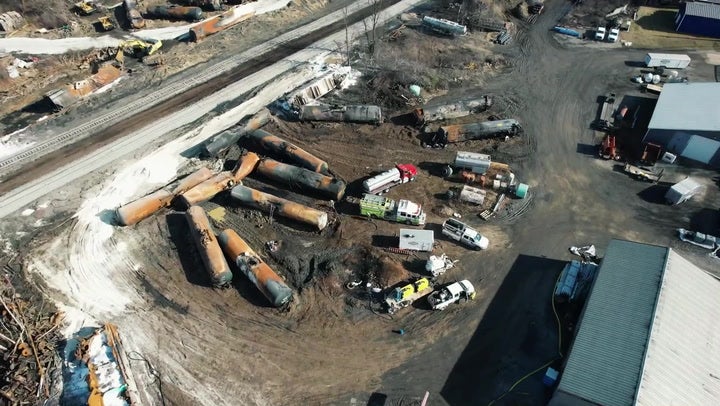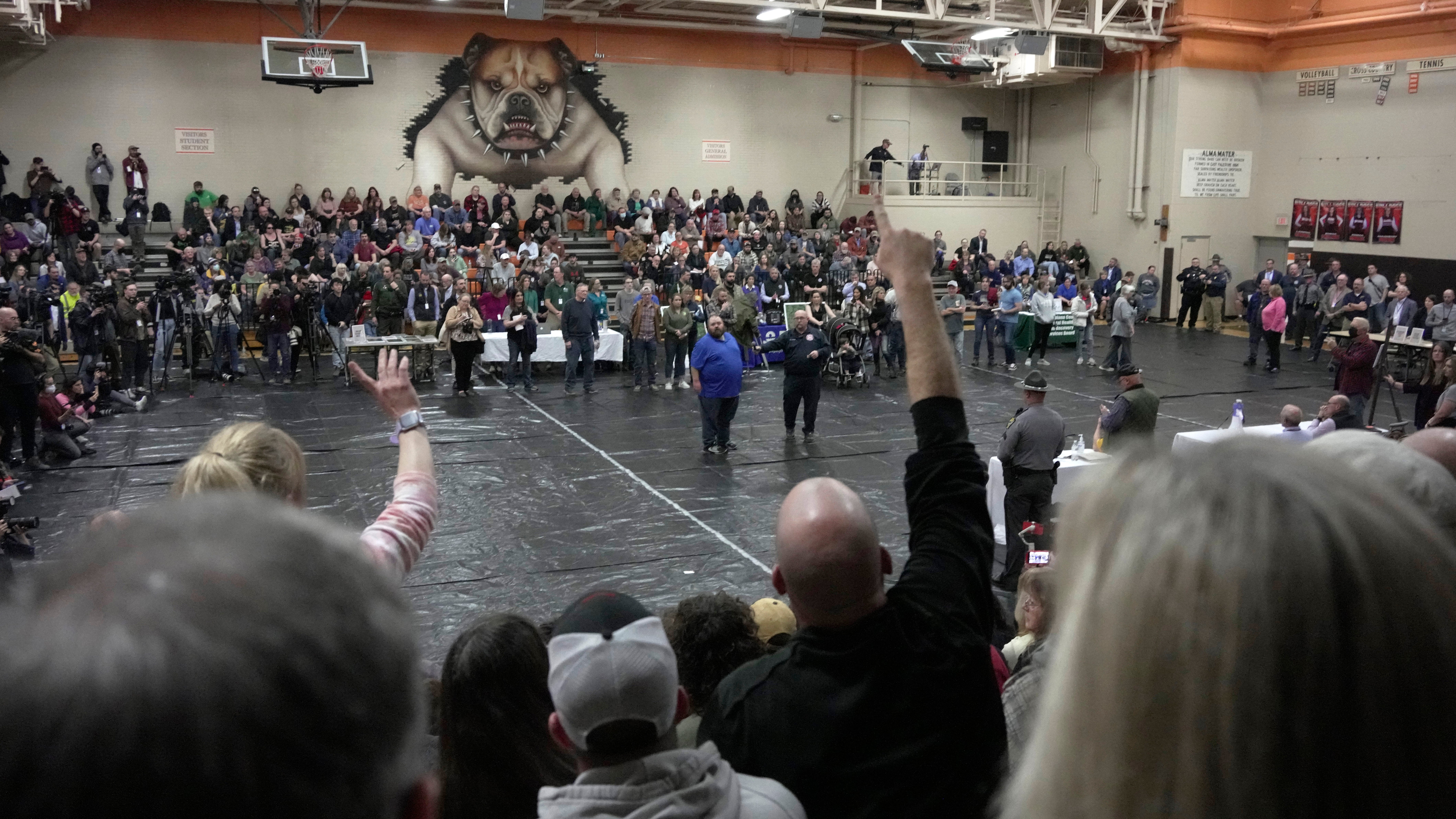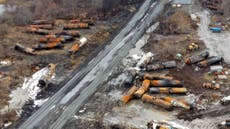‘We’re all very afraid’: Their town is shrouded in toxic chemicals — but the people of East Palestine still can’t get answers
Graig Graziosi reports from East Palestine as residents gather at a town meeting - only to leave with more questions than answers on their fears of catastrophic chemicals


Your support helps us to tell the story
From reproductive rights to climate change to Big Tech, The Independent is on the ground when the story is developing. Whether it's investigating the financials of Elon Musk's pro-Trump PAC or producing our latest documentary, 'The A Word', which shines a light on the American women fighting for reproductive rights, we know how important it is to parse out the facts from the messaging.
At such a critical moment in US history, we need reporters on the ground. Your donation allows us to keep sending journalists to speak to both sides of the story.
The Independent is trusted by Americans across the entire political spectrum. And unlike many other quality news outlets, we choose not to lock Americans out of our reporting and analysis with paywalls. We believe quality journalism should be available to everyone, paid for by those who can afford it.
Your support makes all the difference.A train whistle blew in East Palestine, Ohio, breaking the quiet inside the American Legion hall on Walnut Street.
"It’s almost insulting," Vincent Greene, an attorney at the law firm Motely Price, said as the locomotive blurred through the village. He was in town from the east coast, joining four other attorneys offering advice and legal services to the people of East Palestine.
Only 12 days had passed since the catastrophic Ohio train derailment and subsequent venting of hazardous gas into the sky, but the trains were already back moving their cargo through the heart of East Palestine.
For residents of the village, a return to normalcy seemed out of reach.
The attorneys scheduled their information session with the village residents — featuring pulled pork, mac and cheese, and a hefty dose of sceptism aimed at Norfolk Southern — on the same day the village announced it would hold a town hall meeting with Norfolk Southern.
Less than two weeks earlier, a 150-car Norfolk Southern train derailed after a ball bearing overheated on one of the train’s cars.
The resulting derailment hurled the train’s cars across Taggart Road in East Palestine. Five cars were carrying vinyl chloride, a hazardous chemical used in the production of PVC piping. It is also highly flammable and can also contribute to a rare and aggressive liver cancer.
Fires at the scene of the crash threatened to ignite the cars, forcing Norfolk Southern and the state and local authorities present at the scene to vent and burn the gas to prevent a massive explosion from showering the surrounding mile of village in shrapnel and poison. A massive black pillar of toxic smoke rose into the air above East Palestine.
Residents noticed and began asking questions. Were they in danger? Could they drink water from their wells? Would Norfolk Southern help them?
The village’s mayor, Trent Conaway, called for a town hall meeting to be held on Wednesday, 15 February. Residents believed Norfolk Southern would be on hand to answer questions — and likely take a bit of a verbal licking — from the audience.

By Wednesday morning, things had changed. The meeting was no longer a "town hall" style event, but was changed at the request of Norfolk Southern to reflect an open house, where residents could visit tables manned by local and state officials to have their questioned answered.
Then, after pressuring the mayor to change the meeting, Norfolk Southern told Mr Conaway they simply weren’t coming.
"Norfolk Southern was invited, they pushed the table thing, then told me in a letter they didn’t feel safe and wouldn’t be coming," Mr Conaway said.
By 7pm a line of concerned residents stretched from the doors of the East Palestine high school’s auditorium down West Grant Street.
As people were slowly allowed in, a pair of residents further back in the line were concerned that they would not even make it into the gym before 9pm. If they did make it in, they were sceptical they would be told anything of value.
"There’s a mile long line, and it’s only going until 9pm," Nicole Douglas said while standing more than a block away from the school.
Sean Hutton, Ms Douglas’ partner, said the community has been relying on Facebook community groups to keep each other informed. While state leaders, like Ohio Governor Mike DeWine, has hosted informative press conferences since the derailment, they don’t always make their way onto the screens of residents.
He said attendees would likely be "given 10 different answers" depending on who they speak to and left to figure out amongst themselves which one was the right conclusion.
Inside the gym, things weren’t going much better. The residents were on the floor, surrounding the mayor, and they weren’t looking to be shuffled from table to table.
"This isn’t what we came here for!" one man screamed from the middle of the floor. He and the others took seats in the surrounding bleachers and waited for the answers they’d been waiting for for nearly two weeks.
The press surrounded Mr Conaway, pushing in with recorders and cameras and boom mics. The auditorium’s sound system wasn’t working yet, rendering the mayor barely audible.
With hundreds of residents still being forcibly kept outside, hundreds in the stands demanding a town hall, and a gaggle of press asking the same questions as his residents, Mr Conaway decided to toss Norfolk Southern’s open house idea in the dumpster and opened the doors to the gymnasium, letting the rest of the residents waiting outside in.
The meeting proceeded with a megaphone and a mic.

Residents asked about air and water monitoring; the EPA said it would continue to monitor for as long as necessary, but that thus far it hadn’t detected anything worrisome in drinking water or the air.
Ohio Department of Health Chief Medical Officer Dr Bruce Vanderhoof explained at length why residents might smell the gas, what their risk factor was from exposure to volatile organic compounds, and why it seems as though — despite 3,500 fish dying in Columbiana County streams after the accident — water and air contaminant levels appear to be relatively safe.
Despite the explanation, residents were vocally sceptical that things were just fine in East Palestine.
"I don’t know what to do to provide further assurances," Dr Vanderhoff said after members of the audience challenged his explanation.
The evening continued in a similar fashion — an official, perhaps the Ohio EPA director or perhaps Congressman Bill Johnson — would offer up an explanation and be met with general scepticism.
“We’re all very afraid,” one woman called out from the stands. She was met with applause.

Kayla Miller, a resident who has been making TikTok videos to share her experiences in the aftermath of the train derailment, shared with the EPA that fish were continuing to die in her stream. Staci Reed’s son was hospitalised with rashes, despite levels of air contamination being within acceptable ranges. And Ms Douglas was frustrated with the governor. She wanted to know why FEMA wasn’t in East Palestine.
"All they sent us was a bunch of police," she said, noting the huge state police presence at the auditorium.
By 9pm, the gym was emptying out. The press crowd had thinned, and fewer residents were hanging around in the bleachers. Instead, they waited in line to speak to Mr Conaway, Mr Johnson, and the other assembled state and local officials. A woman wanted to know if it was safe to bathe her "brand new" babies in the village’s water.
A man chimed in his support for the question, asking if East Palestine would "become the next Camp LeJeune."
All Mr Conaway could give was sympathy and limited assurances. His residents were made that Norfolk Southern snubbed them. He told them he couldn’t force them to come. Residents said they were mad at how fast trains come through the village; he told him that was out of his control. Residents expressed frustration with how water testing was carried out, and Mr Conaway reminded them that was a decision made by the EPA, not him.
"I’m a mayor of a town of 4,700 people," he said. "If you think I can fight against a railroad or fight against the EPA or fight against anything like that, you’re crazy."
What he could do was answer questions. And so he did, for the remainder of the evening.



Join our commenting forum
Join thought-provoking conversations, follow other Independent readers and see their replies
Comments